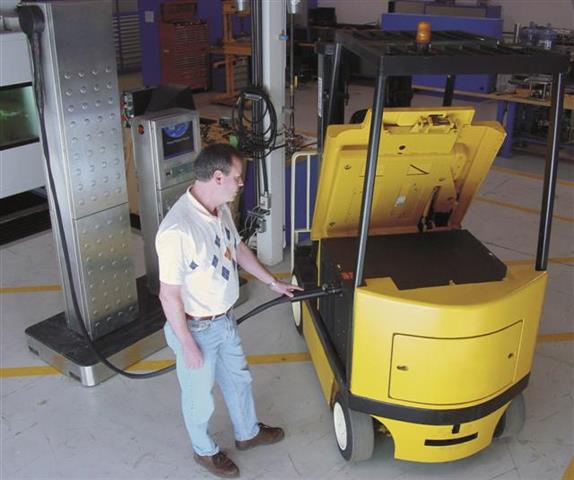 Fueling a Plug Power forklift. PHOTO: NHA |
LiftOne, Air Products & Chemicals Inc and Linde North America were among those touting fuel cell technologies at an industry gathering.
Approximately 2,000 public visitors and more than 700 registrants attended the National Hydrogen Association (NHA) conference and hydrogen exposition at the beginning of April in Columbia. That attendance is significantly higher than prior NHA events.
Harris Pastides, president of the University of South Carolina in Columbia, says: "While large-scale availability of hydrogen-fueled cars is probably years down the road, hydrogen fuel cells already are in use―in forklifts and as back-up energy sources for cell phone towers, for example―and their commercial presence is expected to grow dramatically."
The spirit at the NHA event surprised LiftOne general manager Bill Ryan and sales manager Troy Garrison. "Troy and I were overwhelmed" with the reception for the green initiative from customers and manufacturers, Ryan reports. "A number of people remarked that this is 'cool'."
At the NHA event, Ryan presented a business case for fuel cells in battery-intensive applications.
"Fuel cells run longer (and) cooler than batteries and eliminate battery change-outs," Ryan notes. "Fuel cells run on an operating cost-per-hour basis at 90% of lead-acid batteries" and "fuel cells run on renewable hydrogen and emit zero exhaust―save a little moisture."
Ryan says hydrogen suppliers include Praxair Inc of Danbury, Connecticut; the gases division of Munich, Germany-based Linde AG; Air Products & Chemicals of Allentown, Pennsylvania; and the Shell Hydrogen unit of Royal Dutch Shell plc.
The US Department of Energy (DOE) has provided LiftOne with an USD800,000 grant to demonstrate hydrogen fuel cell technology to groups at businesses, community colleges, service organizations and other on-site classes. Tom Dever, LiftOne fuel cell product specialist, will present "hydrogen 101" seminars on three days per month over three years.
Also under the DOE program, LiftOne is deploying two forklifts with Hydrogenics Corp fuel cells and Air Products mobile dispensing systems to each of six LiftOne customers, initially in mid-May.
Two years ago, nobody had a clue about the potential for uses of hydrogen, Ryan recalls. The current environment feels a lot like the 1970s with garage bands and people building PCs with new capabilities. Now, fuel cell technology is emerging.
"We are proud that forklifts and material handling are playing a key role in the launch to build an infrastructure of alternative energies," Ryan says. "It's the right thing to do, and it feels right!"
Charlotte, North Carolina-based LiftOne, a Carolina Tractor and Equipment division, represents the Caterpillar, Mitsubishi, Linde, Jungheinrich and Kalmar forklift brands and serves Virginia's western regions and the states of North Carolina and South Carolina through eight locations.
Air Products is involved on several fronts, according to Tom Joseph, Air Products business development manager.
Air Products says its hydrogen fueling station technology became operational on 10 February in a pilot program at the US Defence Logistics Agency's (DLA) Susquehanna distribution depot in New Cumberland, Pennsylvania and is now providing power for 40 hydrogen fuel cell powered forklifts in daily warehouse operations. Air Products is delivering liquid hydrogen to the site.
"The project is the first in a series of three research and development pilots of fuel cell and associated hydrogen fueling technologies within the defence distribution center," says Leo Plonsky, research and development program manager for hydrogen fuel cell technologies with DLA. "Not only does this technology reduce DLA's dependence on imported oil, it reduces greenhouse gas emission that can contribute to climate change."
Brian O'Neil, Air Products program manager for hydrogen energy systems, sees value in the project.
"The program at this location provides for a side-by-side comparison during routine operations of the traditional lead-acid battery technology and the advanced hydrogen fuel-cell technology. We believe the performance of the hydrogen-powered materials handling equipment will clearly demonstrate operational, economic and environmental benefits."
Plug Power Inc of Latham, New York outfitted 20 new forklifts and the Deka Nuvera team retrofitted 20 existing forklifts. The team involves East Penn Manufacturing Company Inc of Lyon Station, Pennsylvania and Nuvera Fuel Cells Inc of Billerica, Massachusetts.
Next, a project at the defence depot at Warner Robins, Georgia is slated for a late summer start-up. Warner Robins should get 20 forklifts with fuel cells and have hydrogen reformed on site from natural gas.
Final negotiations are under way for a project at the US Army's Fort Lewis in Pierce County, Washington. That effort calls for 19 new forklifts, generation of hydrogen, heat and power from waste digester methane-rich gas and a mobile refueler for dispersed activities.
Also on the horizon is a plan for the San Joaquin Valley defence depot in Tracy, California to replace 20 propane-powered forklifts and generate hydrogen onsite using solar energy for electrolysis. No award exists there yet.
On March 23, the Linde North America unit of Murray Hill, New Jersey introduced an ionic compressor, a compression system that provides a fast and efficient way to fuel hydrogen vehicles. The unit was on display during the NHA expo.
Linde says the ionic compressor has been used extensively in Europe for cars and buses and is now being introduced to North America for use on forklift trucks. Unlike conventional mechanical systems, the ionic compressor uses an ionic liquid in direct contact with hydrogen instead of a piston in the pressurizing process.
Michael McGowan, head of hydrogen solutions for Linde North America, says: "We're well beyond hydrogen-powered vehicles being a scientific curiosity. The technology Linde has developed demonstrates that fueling these vehicles is a commercial reality. And, with increased emphasis on alternative fuels in the (US) stimulus bill, I think we'll see commercialisation grow at a much faster pace over the next few years."